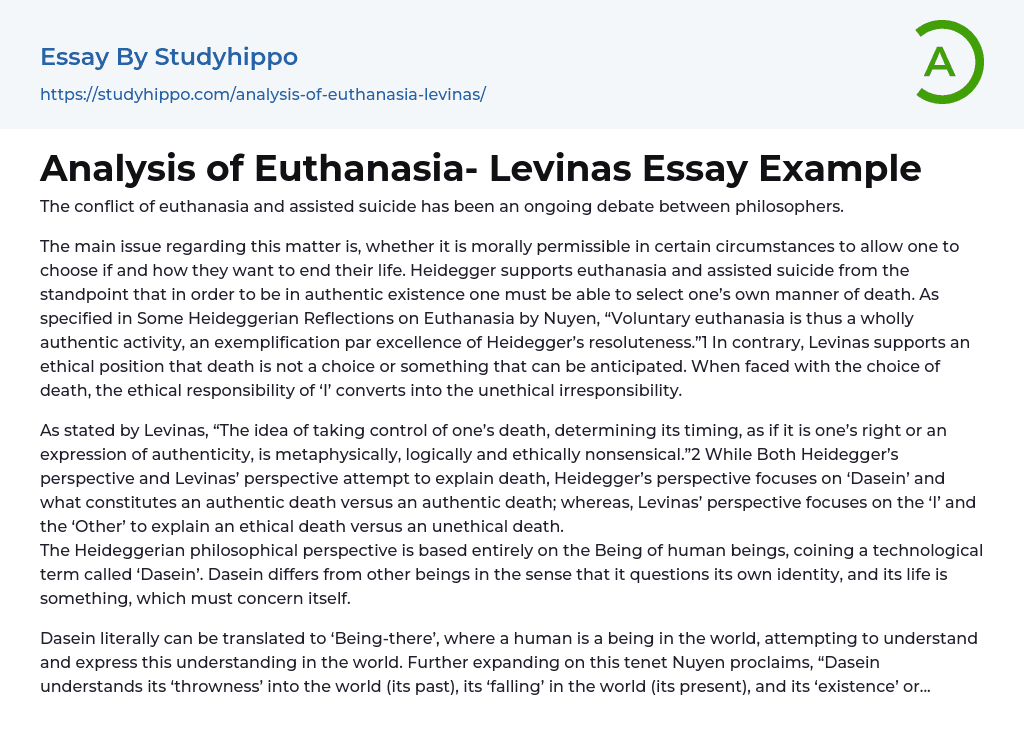The conflict of euthanasia and assisted suicide has been an ongoing debate between philosophers.
The main issue regarding this matter is, whether it is morally permissible in certain circumstances to allow one to choose if and how they want to end their life. Heidegger supports euthanasia and assisted suicide from the standpoint that in order to be in authentic existence one must be able to select one’s own manner of death. As specified in Some Heideggerian Reflections on Euthanasia by Nuyen, “Voluntary euthanasia is thus a wholly authentic activity, an exemplification par excellence of Heidegger’s resoluteness.”1 In contrary, Levinas supports an ethical position that death is not a choice or something that can be anticipated. When faced with the choice of death, the ethical responsibility of ‘I’ converts into the unethical irresponsibility.
As stated by Levinas, “The idea of taking control of
... one’s death, determining its timing, as if it is one’s right or an expression of authenticity, is metaphysically, logically and ethically nonsensical.”2 While Both Heidegger’s perspective and Levinas’ perspective attempt to explain death, Heidegger’s perspective focuses on ‘Dasein’ and what constitutes an authentic death versus an authentic death; whereas, Levinas’ perspective focuses on the ‘I’ and the ‘Other’ to explain an ethical death versus an unethical death.
The Heideggerian philosophical perspective is based entirely on the Being of human beings, coining a technological term called ‘Dasein’. Dasein differs from other beings in the sense that it questions its own identity, and its life is something, which must concern itself.
Dasein literally can be translated to ‘Being-there’, where a human is a being in the world, attempting to understand and express this understandin
in the world. Further expanding on this tenet Nuyen proclaims, “Dasein understands its ‘throwness’ into the world (its past), its ‘falling’ in the world (its present), and its ‘existence’ or...
- Values of Life essays
- Ethical dilemma essays
- Normative Ethics essays
- Virtue Ethics essays
- Belief essays
- Deontology essays
- Moral essays
- Virtue essays
- Work Ethic essays
- Acceptance essays
- Age Of Enlightenment essays
- Child Observation essays
- Confucianism essays
- Conscience essays
- Critical Reflection essays
- Destiny essays
- Determinism essays
- Empiricism essays
- Environmentalism essays
- Epistemology essays
- Ethics essays
- Ethos essays
- Existence essays
- Existentialism essays
- Fate essays
- Free Will essays
- Functionalism essays
- Future essays
- Good And Evil essays
- Human Nature essays
- Individualism essays
- Meaning Of Life essays
- Metaphysics essays
- Natural Law essays
- Personal Philosophy essays
- Philosophers essays
- Philosophy Of Life essays
- Political Philosophy essays
- Pragmatism essays
- Reality essays
- Relativism essays
- Teaching Philosophy essays
- Time essays
- Transcendentalism essays
- Truth essays
- Utilitarianism essays
- Affirmative Action essays
- Assisted Suicide essays
- Capital Punishment essays
- Censorship essays




